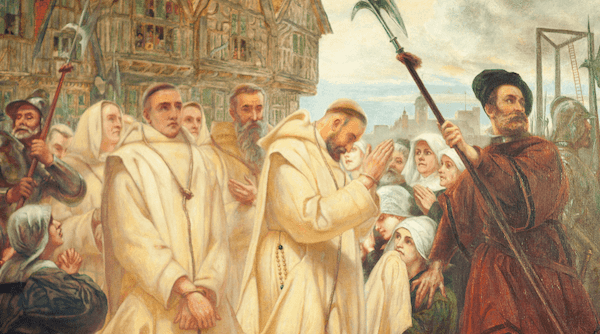In the midst of bustling London, on a sliver of pavement at the intersection of Edgware and Bayswater Roads, not far from the well-known Marble Arch, stands a marker, which reads, “The site of Tyburn Tree.”
In an abandoned cell, inside the now derelict Auschwitz Prison Block 11, is an image of the Sacred Heart, etched by a prisoner’s hands.
Those who suffered for their beliefs in these places of infamy, including the Tyburn martyrs and St. Maximilian Kolbe, have long since gone before us. Silenced for their beliefs by regimes much stronger than their poor capacity to resist, their voices should have been extinguished forever. These simple markers should be the only remnant of their overpowered and seemingly futile witness.
And yet, it is the tyrants and regimes themselves which have fallen away, powerless and defeated. The gates to Auschwitz-Birkenau today swing open, empty and deserted. The all-encompassing power that manned the guard towers and supervised the trains has long since passed away. The gates of Hampton Court now welcome day visitors, its hallowed tenant, Henry VIII, reduced to empty legend.
But the gates of Tyburn Convent joyfully welcome consecrated souls offering their lives in prayer for that Faith and Truth, which all the King’s horses and all the Queen’s men could never conquer.
The crypt of Tyburn Convent houses the Martyr’s Chapel, a stunning collection of precious relics of the brave men and women – lay faithful, priests, and religious, who preserved the Faith in England under the reign of terror. Among the quotes inscribed upon the crypt walls are words spoken by Carthusian Prior John Houghton. “I am bound in conscience, and am ready and willing to suffer every kind of torture rather than deny a doctrine of the Church,” he declared from the scaffold of Tyburn Hill, London, on May 4, 1535.
From his cell in Bell Tower, St. Thomas More, himself soon to be martyred, famously witnessed the procession to Tyburn of these Carthusian martyrs, noting to his daughter Margaret, “these blessed fathers be now as cheerfully going to their deaths as bridegrooms to a marriage.”
One of the great temptations, when we risk everything for the truth, is to think our sacrifice will be futile. We will give all, and it will not have mattered. The object will be lost, the world will forget, and we will be forgotten. Even Our Lord, we fear, will forget our act of love, and generosity. It will be useless and fruitless. And so we waver.
But Our Lord will never forget. The self-immolation will itself be the cause of the fruit; the offering will have power because it is absolute. Only in holding nothing back, in giving everything, can we hope to gain anything worth keeping.
Saint Paul, having endured intense sufferings and facing a martyr’s death, declared with confidence in the reward of righteousness, that only one thing mattered: to fight the good fight, to stay the course, to keep the faith. (2 Timothy 4: 7-8)
“To love is to give of one’s all, including oneself,” St. Thérèse of Lisieux assures us.
In a letter written to her Mother Prioress on Passion Sunday, March 26th, 1939, a few brief years before her own death in Auschwitz, St. Edith Stein requested, “Please will Your Reverence allow me to offer myself to the heart of Jesus as a sacrifice of propitiation for true peace, that the dominion of the Antichrist may collapse?. . .I would like my request granted this very day because it is the twelfth hour. I know that I am nothing, but Jesus desires it, and surely He will call many others to do likewise in these days.”
The twelfth hour. We so often speak of the eleventh – that moment in which a glimmer of hope still remains. But Christ delights in twelfth-hour love. He allows us to see the dream die, and the fight to be lost, and then. . .He acts. He demands hope when all hope is lost.
“By faith Abraham, when he was tested, offered up Isaac […]. He considered that God was able to raise men even from the dead; hence he did receive him back and this was a symbol.” (Hebrews 11:17-19)
Lazarus has died (John 11:1-44); Jairus’ daughter has breathed her last (Mark 5:21–43, Matthew 9:18–26, Luke 8:40–56). Christ, it seems, has come too late. We can throw up our hands and declare that all is lost, or we can raise up our hands and declare in faith, Lord, to You is the Victory. The sanctuary lamp of Our Lady’s heart glows ardent and undimmed in the Upper Room, even as He lies in the tomb.
To join the Wedding Procession of the Lamb requires our stepping out in faith. To go ahead today requires heroic love, a “perfect love,” which “casts out fear.” (1 John 4:18) As the narrator declares in the final Act of Karol Wojtyla’s The Jeweler’s Shop, “Love was stronger than fear, and today they went ahead.”
Christ and His Church need our courageous love and witness, today, at this hour. As we offer Him our lives, through a love stronger than fear, stronger even than death, He will give us all we cannot keep except by losing, in Him. We give our hearts to Him with twelfth-hour love, and watch His saving power achieve the ultimate Victory.
Image: The Carthusian Martyrs at Tyburn by Andrew Brown Donaldson, c. 1900 [London Charterhouse]




